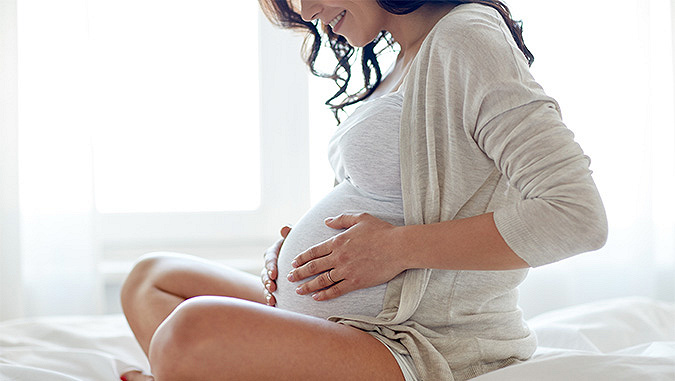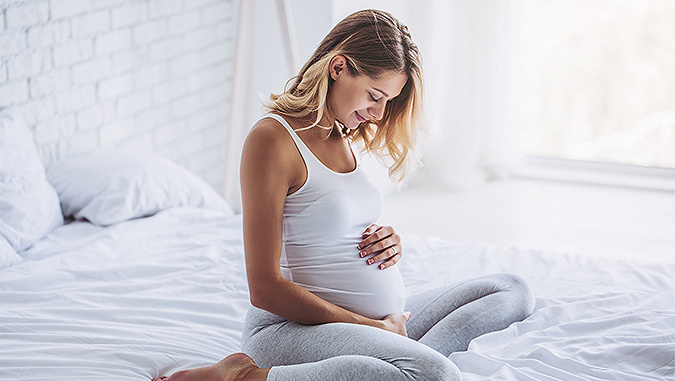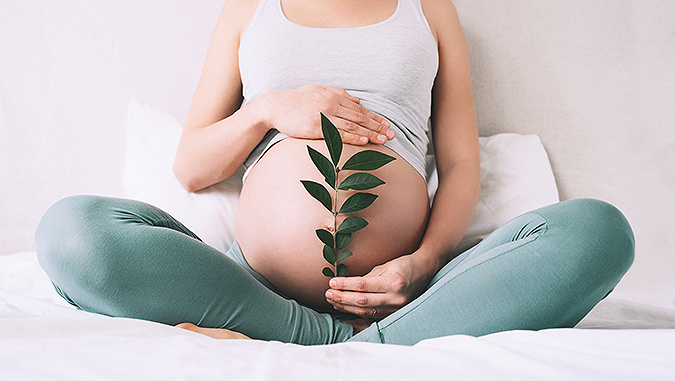Pregnancy – what do you need to know?

Mum and Dad, are you expecting a baby? In this article, you'll find the basics for future parents, learn about many interesting and non-obvious things about pregnancy, about its course and how to prepare to welcome your newborn.
Duration of the pregnancy
As you know, pregnancy lasts from fertilisation and implantation of the egg in the uterus until delivery. The duration of pregnancy is approximately 280 days, i.e. 40 weeks.
In general, it can last a dozen or so days more or less, and the due date is flexible, and usually fluctuates 8-10 days. The duration of pregnancy varies depending on whether you start counting from the date of fertilisation or not (if you do not know when this day was). If mum knows the date, according to precise calculations, her pregnancy will last 266 days (38 weeks).
There are also premature births, where labour comes on between the 24th and 37th week of gestation.
Why are some pregnancies counted from the last period?
The moment of fertilisation is difficult to establish precisely. In around half of cases, it is impossible to determine. That's why the beginning of the pregnancy is taken to be the first day of the last period. Then, the length of the pregnancy is approximately 280 days (assuming that the woman has a regular cycle, i.e. 28 +/- 5 days). This is the assumption of the German obstetrician Franz Naegele, who at the end of the 19th century developed the rules for calculating the due date.
How can you calculate the due date?
The due date can be calculated based on Naegele's rules, the date of fertilisation, date of the first movements of the foetus, date the body temperature increases, the pelvic floor height and ultrasound examinations.
For ultrasounds, the doctor bases their calculations on the first test carried out in early pregnancy, ideally before week 10. In later stages, this method is not reliable, because every child grows at their own pace.
For 28-day cycles, the following formula is used from Naegele's method:
last period + 7 days – 3 months + 1 year = due date
Example:
First day of the last period – 5 May 2021
5 May 2021 + 7 days = 12 May 2021
12 May 2021 – 3 moths = 12 February 2021
12 May 2021 + 1 year = 12 February 2022
However, please remember that this method won't work for women with irregular cycles.

Calculating gestation based on an ultrasound
Ultrasounds are considered to be the most precise method of determining gestation and your due date. The doctor conducts various measurements of the foetus, including head and stomach circumference, and the length of the femur. This method is more reliable the earlier it's carried out – it should be done in the first trimester. Later, children develop in the womb at different paces, which affects the results of the calculations.
Breakdown into trimesters
Pregnancy can be divided into weeks and months, and trimesters have also become popular. This is a convenient solution, as it enables us to easily capture the stages of foetal development. Doctors find a week-by-week breakdown to be more important. The first trimester lasts approximately until week 13 of the pregnancy, the second to week 27, and the third ends at birth.
1st trimester
In the first three months, the pregnancy is not visible to the naked eye. But it's in the first trimester that the embryo develops the most intensively – crucial internal organs are formed, and the heart starts beating. The child starts growing between week 10 and week 13. In the first month, the head and eyes start to take shape. At the end of the month, the face resembles a human face, the eyes, nose and ears start to take shape, and the shape of the arms can be seen. Blood vessels and vertebrae slowly form. In the second month, the skeletal system ossifies and the digestive system separates from the genitourinary system. Interestingly, the main fingerprints will appear at this stage!
What happens to the mother's body in this trimester? The woman may feel worse, be tired, and suffer from insomnia, vomiting and nausea. The breasts become fuller, firmer and sensitive. There may be flatulence, constipation or indigestion. At this stage it's better to eat smaller portions more frequently. In addition, the uterus begins to press against the bladder, which may make you need to urinate more often. The hormones start to go crazy and this can manifest in an emotional rollercoaster. Mum! This is a time when you need to rest the most. Whenever you feel like it, take a nap or relax without feeling guilty.
You may also experience changes in your sense of taste and smell. You may start to hate foods you used to love, and some smells, for example, of cosmetics, may become unbearable. This is completely natural and you shouldn't worry about it. The most important thing is to consult your health with your doctor at regular check-ups.
2nd trimester
The second trimester is much more pleasant. Unpleasant ailments usually disappear, and the risk of miscarriage also decreases. Your emotions are usually a little more under control than in the first trimester, you get more energy and feel better overall. Your tummy slowly starts to get rounder and you may feel your baby moving.
This is when the embryo becomes a foetus. It's formed, it develops and grows intensively. Its senses develop dynamically. Your child can now hear, react to light, open their eyes and taste. Tooth buds start to form, and the eyebrows, eyelashes and nails start to grow. The development of the nervous system starts to gain pace, and the brain has all of its neurons. Nerve impulses are faster, and new connections are formed between neurons. This is also when the phases of sleep and being awake can be observed.
3rd trimester
In the third trimester, (sometimes already at the end of the second), mum starts to feel the extra weight and pressure from the growing uterus on other internal organs. She may complain about back pain, calf cramps, swollen legs and varicose veins, as well as the need for frequent urination. She may also suffer from increased heartburn, which is troublesome for some mothers. Turbulent emotions, irritability and fatigue also return. Sleep issues often arise.
The child increasingly resembles a newborn. They're growing bigger and there's less and less room for them to move around in the belly. What's most important is that at this stage, the brain is developing intensively. The cerebral cortex is active, and the nervous system controls the movements of the body. In the seventh month, the baby acquires sucking, stepping and grasping reflexes. In the eighth month, the main thing that's developing is the respiratory system. The baby's body starts to get more rounded, and two weeks before birth, they stop growing lengthways and only gain weight.

What affects gestation?
A textbook pregnancy lasts nine months, i.e. 280 days. If everything goes smoothly, the child is healthy, is gaining weight, and there are no complications. After the end of the eighth month of pregnancy, mum can calmly wait for the baby to arrive, knowing that all their organs are fully developed.
It's good to know that if the child is born two weeks early or late, everything is normal. Just 5% of children are born on their predicted due date. Only larger deviations are dangerous. The most important factors that affect gestation are stress and strain.
That's why it's crucial that during pregnancy mum has a healthy lifestyle, eats well, doesn't get too tired, and avoids stress and excessive physical strain. Physical and emotional support from loved ones is needed.
What risks does premature or overdue labour bring?
Unfortunately, the shorter the pregnancy, the worse it is for the child's development. In current times, given our advanced medicine, premature babies have a much higher chance of survival and healthy development. However, you need to be aware that only the right development over nine months in the mother's womb guarantees that all life functions work like they should, and that the organs are correctly formed. The time needed to prepare the child for life outside the womb is 280 days.
Premature labour occurs when the baby is born between the 24th and 36th week of gestation (+6 days). The earlier the labour, the higher the health risk to the child. Reasons for preterm birth include stress, infection or inflammation.
The flip side of preterm birth is post-term labour. This is when the pregnancy lasts more than 42 weeks. Is it risky? It does come with higher risk, and can have consequences for both mum and baby. The child starts to get cramped in the womb, and movement becomes more difficult. The deteriorating placenta isn't able to provide your baby with enough nutrients.
Hospital bag – what should you pack?
Let's start by saying that you should do this early – four to five weeks before the due date. After this, you'll just have to add your personal items.
You should only take necessities with you to the hospital. It's good to follow the rule of packing items in the order that what you're most likely to need is at the top. Items for your newborn should be packed at the bottom, then anything you'll need after labour, and then – for the labour and at the end – nightgowns, slippers and personal items.
Don't forget the documents you'll have to show in the emergency room. You'll need your personal ID card, pregnancy card, original blood group test results, culture results for group B streptococci (GBS) and the results of tests performed during your pregnancy. If you have a chronic disease and are taking regular medication, you'll need to also take this with you and inform your midwife and doctors at the hospital about this.
Hospitals usually provide you with a list of things that you should bring with you (e.g. on their websites). If there's no such list, find out whether the hospital will provide, for example, postpartum pads, delivery gowns, nappies, baby cosmetics, etc.
Pregnancy and birth are a unique and often difficult time for mum, and that's why she should always receive as much support as possible from her partner and loved ones. She'll need a lot of help particularly at the end of the pregnancy and in the first months after birth, and not only in household chores. She'll also need emotional support. The mother should feel that she can always count on the help of her loved ones.
